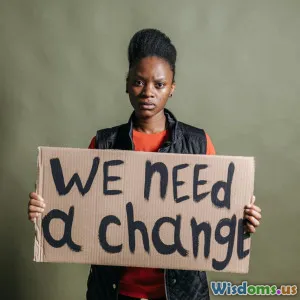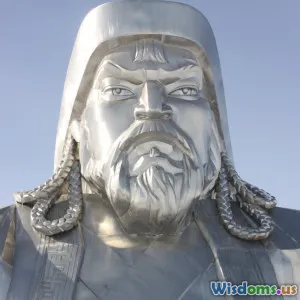
Predicting Future Influences Who Will Shape History Next
8 min read Explore how to predict future influencers shaping history and what traits mark tomorrow's game-changers. (0 Reviews)
Predicting Future Influences: Who Will Shape History Next
History is a living tapestry, woven by the actions of extraordinary individuals who redirect the currents of human events. From Gandhi's nonviolent resistance to Marie Curie's pioneering science, knowing who will be the next trailblazers shaping history is a fascination shared across disciplines—be it in politics, technology, art, or social movements. But can we really predict who will influence tomorrow's world? This article delves into the methods and indicators that help us identify future historical figures, uncovering patterns and societal catalysts that spotlight them before they rise.
Introduction: The Quest to See Tomorrow’s Titans
Traditionally, history has been written in hindsight—heroes and visionaries finalized only after their impact. However, in our rapid digital age, characterized by vast data resources and social insights, attempts to forecast future influencers gain traction. Think tanks, sociologists, and futurists attempt to identify emerging leaders early by analyzing traits, social trends, and spheres of influence. Understanding who will shape upcoming decades empowers societies to better steer progress, sponsor innovation, or advocate justice.
Yet, predicting future influences is complex. Beyond luck and timing, certain characteristics archive across figures who later reshape history. The aim is to decode these variables, providing not only foresight into individuals but broader understanding of societal evolution.
The Anatomy of a Future Influencer
Vision Coupled with Action
At the core of nearly every historic figure is a clear vision—a distinctive idea about how the world could and should be. Vision becomes transformative only when coupled with action. Dr. Martin Luther King Jr. didn’t merely dream of equality; he mobilized millions with nonviolent protests.
Future influencers show brilliance not just in thought but in tangible achievements and leadership that literally shift paradigms. Emerging tech entrepreneur Elon Musk illustrates this: his vision of space travel and sustainable energy challenges existing industries.
Ability to Harness Emerging Trends
Influencers who shape future history often rise at the intersection of innovation and widespread societal need. For example, figures like Malala Yousafzai, who championed girls’ education amid oppressive regimes, tapped into a growing global consciousness emphasizing human rights.
Observing which issues capture public attention and anticipating future societal priorities is key. Today, climate change activists like Greta Thunberg rise by activating urgent environmental action, indicating that future history-makers align with evolving global challenges.
Resilience and Adaptability
History teaches us disruption often meets fierce resistance. Figures destined for long-lasting influence show resilience under opposition. Consider Nelson Mandela, imprisoned for decades before catalyzing racial equality in South Africa.
Moreover, adaptability—pivoting approaches while maintaining core principles—is vital. Future influencers not only anticipate change but navigate uncertainty, optimizing impact without losing authenticity.
Analyzing Social and Technological Contexts
Predicting tomorrow’s influential figures cannot ignore the shifting landscapes they inhabit.
Digital Platforms as Amplifiers
Social media and digital networks turbocharge the rise of emerging voices. Platforms like Twitter can thrust activists or thought leaders into global consciousness rapidly. For instance, during the Arab Spring, young activists utilized social media to influence domestic politics and global awareness.
Analysts now scan these platforms for rising voices, tracking engagement metrics, sentiment analyses, and network effects to identify potential future influencers early.
Globalization and Cross-Cultural Impact
Future history-makers increasingly transcend borders; their influence spreads in globalized settings. Figures influencing environmental policy, human rights, or entrepreneurship gain traction by forging international coalitions and appealing to universal values.
For instance, climate policy activist Vanessa Nakate from Uganda gained prominence partly due to a unique African perspective on climate impact, amplified worldwide. Thus, future influencers are often those with abilities to navigate and unify diverse cultural narratives.
Case Studies: Recent Figures Forecasted as Future Historical Influences
Jacinda Ardern: Compassion in Leadership
New Zealand’s Prime Minister, Jacinda Ardern, garnered praise for empathetic crisis management during the Christchurch shootings and COVID-19. Her emphasis on kindness, transparency, and rapid response modeled a leadership style many predict will become increasingly important reflecting societal demands for ethical governance.
Timnit Gebru: Advocating Ethical AI
As artificial intelligence reshapes economies and lives, Timnit Gebru stands out as a champion for addressing AI bias and ethics. Her work highlights necessary debates on technology’s societal impact, placing her in a critical position to influence both tech development and policy.
Amanda Gorman: The Voice of a New Generation
At 22, Amanda Gorman’s poetry at President Biden’s inauguration captured hopes for social justice and unity. Literature and art remain powerful influencers of culture, and Gorman’s rise signals how young creatives can become historic voices shaping cultural identity.
The Role of Institutions and Societies
The environments surrounding potential influencers matter greatly. Strong institutions supporting innovation, education, and human rights often incubate figures capable of broad impact.
Countries like South Korea invest heavily in STEM education, producing innovators and leaders who are reshaping technology globally. Similarly, support structures like scholarships, mentorships, and think tanks amplify individuals’ abilities to act on their visionary ideas.
Societies that promote freedom of speech, diversity, and dialogue enable potential influencers to evolve and flourish.
Conclusion: Cultivating and Recognizing Tomorrow’s History Makers
While predicting who will shape history next is inherently uncertain, identifying the convergence of vision, resilience, context, and emerging trends uncovers probable candidates. As global challenges grow complex—from climate crises to technological ethics—future influencers must embody adaptive leadership and ethical commitment.
For the public and institutions alike, awareness of these markers facilitates nurturing talent and promoting conditions where transformative figures can rise. In a world hungry for positive change, recognizing and empowering tomorrow’s influencers remains not just an academic exercise but a crucial societal investment.
————
References
- Gladwell, M. (2008). Outliers: The Story of Success. Little, Brown and Company.
- Nye, J. S. (2004). Soft Power: The Means to Success in World Politics. PublicAffairs.
- UNESCO. (2020). Global Education Monitoring Report.
- TED Talks and speeches from Greta Thunberg, Amanda Gorman.
Unlock insights from history to better navigate the future: by understanding emerging leaders and patterns, we glimpse the architects of tomorrow's world.
Rate the Post
User Reviews
Popular Posts



















